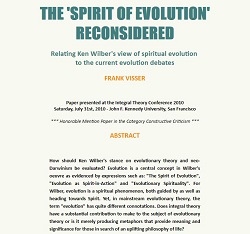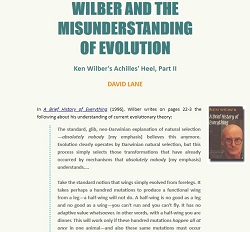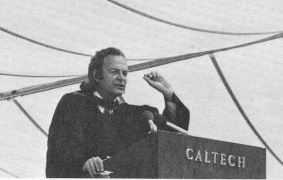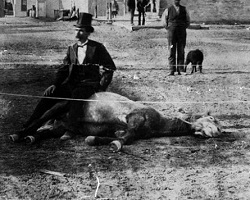TRANSLATE THIS ARTICLE
Integral World: Exploring Theories of Everything
An independent forum for a critical discussion of the integral philosophy of Ken Wilber
 David Christopher Lane David Christopher Lane, Ph.D.
Professor of Philosophy, Mt. San Antonio College Lecturer in Religious Studies, California State University, Long Beach Author of Exposing Cults: When the Skeptical Mind Confronts the Mystical (New York and London: Garland Publishers, 1994) and The Radhasoami Tradition: A Critical History of Guru Succession (New York and London: Garland Publishers, 1992). On Beating a Dead Horse
The Scientific Challenge to Ken Wilber
and Why it Matters
Frank Visser and David Lane
The strict theory of natural selection suffers from not acknowledging the role played by Spirit in evolution. (Ken Wilber, Eye to Eye, 1983, p. 205).
This is a case, not of scientism, but of its opposite: see-erism or visionary science. Both overstep their own boundaries.
No subject has been discussed more widely on Integral World over the past two decades, at least by the two of us, than that of biological evolution. Why would that be the case? Isn't Ken Wilber primarily a spiritual philosopher who claims to have detailed knowledge of the developmental stages and states of human consciousness and culture? The reason is that from his very first publication The Spectrum of Consciousness in 1977 to his latest volume The Religion of Tomorrow (2018) Ken Wilber has tied these areas to the question of evolution, as seen from a spiritual perspective. To make the case for this spiritual view of evolution he has, rather infrequently, but consistently, referred to the evolutionary "failures" of science.
And that's where the trouble starts. But we are getting ahead of the story. First read this:
One cannot, logically, ontologically, or metaphysically derive the higher from the lower. The higher modes can emerge because, and only because, they were enfolded, as potential, in the lower modes to begin with, and they simply crystallize out and differentiate from the lower modes as evolution proceeds. (Ken Wilber, The Atman Project, 1981, p. 174-5)
The point, in a phrase, is that the orthodox scientific theory of evolution seems correct on the what of evolution, but it is profoundly reductionistic and/or contradictory on the how (and why) of evolution. But if we look upon evolution as the reversal of involution the whole process becomes intelligible. (Ken Wilber, The Atman Project, 1981, p. 305)
Whatever you might think of this theory of involution/evolution, or Efflux/Reflux, it certainly solves the problems of where the Big Bang itself came from, and how higher forms manage to emerge from lower forms, a perpetual puzzle to philosophers and scientists alike. ‘You can't get the higher from the lower’ is a common refrain you hear when philosophers and scientists discuss this issue, but this theory takes care of that problem: the higher emerges ‘out of’ or ‘through’ the lower in evolution because it was put there in involution, which is the creation of ‘the lower from the higher,’ which involves no theoretical problems at all. (Ken Wilber, The Religion of Tomorrow, 2018, p. 149)
From the above quotes we can distill the major elements of Ken Wilber's view on biological (and cosmological) evolution:
- Evolution cannot exist without its counterpart "involution", which precedes it and which involves Spirit, or Eros.
- This is in contrast with the current "orthodox" or "strict" scientific theory of evolution (no further schools of biological thought are mentioned).
- Scientists and philosophers cannot explain "how higher forms manage to emerge from lower forms", whereas this spiritual theory can.
- Current scientific theory is "contradictory", can't answer the why and how of evolution, though it "seems correct" on the what of it.
- But due to his spiritual alternative, Wilber confidently proclaims that "the whole process [of evolution] becomes intelligible."
- This spiritual view of evolution "involves no theoretical problems at all", it even "solves the problems of where the Big Bang itself came from."
- His view offers a simple solution: the higher forms "simply crystallize out and differentiate from the lower modes as evolution proceeds."
In our opinion, this view needs to be challenged, for it is at variance with the findings of science. We could call this view "mystical creationism", or "mysterianism", or "crevolutionism" or "creativism". This is a case, not of scientism, but of its opposite: see-erism or visionary science. Both overstep their own boundaries. Where scientism oversteps its boundaries by making statements about ultimate questions, see-erism applies meditative insights to empirical questions that belong to the domain of science.
However we want to call it, it is presented with much confidence as an alternative or complement to the standard, "reductionistic" approach to evolution of science. But it stands or falls with the validity of Wilber's assessment of the supposed problems or science. Economy requires we first try to explain the processes and products of evolution in naturalistic ways, before we give in to the "transcendental temptation" of invoking a God, or Spirit, or Eros (Wilber's favorite term) that is responsible for the emergence of complexity.
This is the point: will science ever be able to affirm or deny Spirit? No (scientism). But does it make sense to introduce the notion of Spirit in evolution, without any specifics as to when, how and why? Equally no (see-erism). Is it therefore valid or helpful to pronounce on empirical matters related to evolution, from this spiritual vantage point? Not in the least, in our opinion.
What if science does succeed in explaining the mysteries of evolution? Then there is obviously no need for any involution, Eros or transcendental intervention at all. Wilber's house of cards will fall apart. Since he has invested four decades in his spiritual philosophy, one can imagine Wilber is not a neutral observer of neo-Darwinism. He has an interest in seeing it fail, so he can present his alternative solution to his readers as a viable alternative. He can even "include" the findings of science, as soon as they come available, minus their so-called "reductionism".
Page after page has been devoted on Integral World to an analysis of Wilber's statements on evolutionary science. I have tried to summarize it in the paper "The 'Spirit of Evolution' Reconsidered" (2010), quoting extensively from all of Wilber's offline and online writings. But it all started with a blog post back in 1997, written by professor of the sociology of religion David Lane, which was reposted on Integral World as "Ken Wilber and the Misunderstanding of Evolution". These writings have received little response from integral corners—and least of all from Ken Wilber himself.
 
Only on two occasions has Ken Wilber addressed the topic of criticism of his work—both in the form of blog postings. Both can be read as rationalizations for avoiding pertinent criticism. In 2006 he posted an, apparently satirical, series of posts, in what has become known as the Wyatt Earp Episode, covering various areas of criticism he has received over the years. The subject of evolution, however, was not touched upon.
Then in 2007, he posted "Some Criticisms of My Understanding of Evolution", in which he backtracked on extreme statements he had made in A Brief History of Everything (1996) on the evolution of eyes and wings, but insisted on his belief that "the intrinsic force of self-organization", "some sort of Eros in the universe", is responsible for the complexity we see around us. He explicitly downplays Eros by stating "It doesn't have to be a metaphysical force", though that seems only a strategic concession. A comprehensive reading of his works proves it is meant to be a spiritual force in the universe.
Of the comments we received on social media platforms, most notably on Facebook and its various integral groups, about half were supportive of our efforts. Wilber had indeed a rather loose grip on this field of science, and addressing this question is a matter of intellectual integrity, to say the least. Others however, presented arguments more or less in defense of Wilber, to the extent that Integral Theory is not about a specific field of science, but a meta-theory that can classify the various theories devised by the human mind into a unique and coherent whole. Or it was proposed, following integral orthodoxy, that neo-Darwinism presented at most only one quarter of the puzzle of reality, given its location in the Lower-Right quadrant. This is integral jargon for saying population genetics deals with "collective exteriors", but not with the interior dimensions of existence.
And some just bluntly said to me: "Frank, you are beating a dead horse", "you have made your point, now either stop it or come up with an alternative model of your own. Wilber will never respond". This misses the point entirely of the purpose of critical enquiry in science.
‘a kind of scientific integrity’
When a new theory is advanced in science, on two fronts critical enquiry is of the utmost importance. First, scientific colleagues will engage critically with the new theory, to test its strength and/or expose its weaknesses. Ideally this is done in good spirits, for this is the only way the scientific knowledge quest can advance. But more importantly, the scientist himself who comes up with a new theory needs to be self-critical. Not only that, he needs to actively seek out any argument that might contradict his cherished views.
As Richard Feynman, the Nobel Prize winning physicist, so persuasively argued in his now famous “Cargo Cult Science” Speech at Cal Tech in 1974.[1] (Cargo Cult Sciene is another word for pseudo-science here.)
 Richard Feynman, 1974
Richard Feynman, 1974
But there is one feature I notice that is generally missing in Cargo Cult Science. That is the idea that we all hope you have learned in studying science in school—we never explicitly say what this is, but just hope that you catch on by all the examples of scientific investigation. It is interesting, therefore, to bring it out now and speak of it explicitly. It's a kind of scientific integrity, a principle of scientific thought that corresponds to a kind of utter honesty--a kind of leaning over backwards. For example, if you're doing an experiment, you should report everything that you think might make it invalid--not only what you think is right about it: other causes that could possibly explain your results; and things you thought of that you've eliminated by some other experiment, and how they worked--to make sure the other fellow can tell they have been eliminated.
Details that could throw doubt on your interpretation must be given, if you know them. You must do the best you can—-if you know anything at all wrong, or possibly wrong—to explain it. If you make a theory, for example, and advertise it, or put it out, then you must also put down all the facts that disagree with it, as well as those that agree with it. There is also a more subtle problem. When you have put a lot of ideas together to make an elaborate theory, you want to make sure, when explaining what it fits, that those things it fits are not just the things that gave you the idea for the theory; but that the finished theory makes something else come out right, in addition.
In summary, the idea is to try to give all of the information to help others to judge the value of your contribution; not just the information that leads to judgment in one particular direction or another.
And he concludes, that even if you may gain temporary fame and excitement, "the truth will [come] out":
We’ve learned from experience that the truth will out. Other experimenters will repeat your experiment and find out whether you were wrong or right. Nature’s phenomena will agree or they’ll disagree with your theory. And, although you may gain some temporary fame and excitement, you will not gain a good reputation as a scientist if you haven’t tried to be very careful in this kind of work. And it’s this type of integrity, this kind of care not to fool yourself, that is missing to a large extent in much of the research in Cargo Cult Science.
And in dealing with the layman public, scientists must take care of a specific responsibility: "bending over backwards to show how you’re maybe wrong":
But this long history of learning how to not fool ourselves—of having utter scientific integrity—is, I’m sorry to say, something that we haven’t specifically included in any particular course that I know of. We just hope you’ve caught on by osmosis.
The first principle is that you must not fool yourself—and you are the easiest person to fool. So you have to be very careful about that. After you’ve not fooled yourself, it’s easy not to fool other scientists. You just have to be honest in a conventional way after that.
I would like to add something that’s not essential to the science, but something I kind of believe, which is that you should not fool the layman when you’re talking as a scientist. I’m not trying to tell you what to do about cheating on your wife, or fooling your girlfriend, or something like that, when you’re not trying to be a scientist, but just trying to be an ordinary human being. We’ll leave those problems up to you and your rabbi. I’m talking about a specific, extra type of integrity that is not lying, but bending over backwards to show how you’re maybe wrong, that you ought to do when acting as a scientist. And this is our responsibility as scientists, certainly to other scientists, and I think to laymen.
Integral With Integrity
Consider this, then, to be an Open Letter to Ken Wilber and the Integral Community.
Comparing the mentality advocated by Richard Feynman with that displayed by Ken Wilber, the contrast couldn't be more extreme. When it comes to the topic of evolution, has Wilber shown this type of intellectual integrity of "bending over backwards to show how you’re maybe wrong"? No. He has constructed a spiritual view of evolution and argued for it by throwing out second-rate creationist "arguments" that biological complexity cannot possibly have come about by chance alone. It has given him "fame and excitement" for sure. But isn't truth in the end much more valuable?
Hard core integralists will predictably dismiss this line of approach as "reductionistic", "Orange" (exclusively rationalistic, in the lingo of Spiral Dynamics), "unspiritual" or "unintegral". Feynman himself will be dismissed as somebody who "still believes in matter, which doesn't exist anyways at a deeper quantum level". Or, "science is also a faith, in matter". Or, "science has its own dogmatism". All typical answers for pseudo-science advocates. And irrelevant. For us, this critical perspective represents a vital ingredient of any integral approach to reality. It would not be a step down from the lofty heights of spirituality to “mere” rationality, but a step up from integral fundamentalism, which unreflectively engages Wilbers body of work.
Consider this, then, to be an Open Letter to Ken Wilber and the Integral Community. A plea to openly and publicly address criticism. Integral Theory should transcend and include science, not by-pass it in a cursory way to be able to further its own spiritual agenda. An integral theory without integrity is ultimately bankrupt.
But we will give (a younger and wiser) Ken Wilber the last word. In his analysis of cultic movements he provided a relevant distinction. If only this were true of the integral community.
"Does the group allow free and rational inquiry into its teachings? Or does it discourage or even prevent critical analysis of its own tenets? Does it allow or encourage comparison and assessment of its methods and teachings with those of other paths, not as propaganda but as free inquiry? A transrational group will usually insist on this; a pre-rational group will avoid it." (Ken Wilber, Spiritual Choices, 1987, p. 248).
NOTES
[1] R.P. Feynman, Cargo Cult Science, Some remarks on science, pseudoscience, and learning how to not fool yourself. Caltech's 1974 commencement address.
|

 Frank Visser, graduated as a psychologist of culture and religion, founded IntegralWorld in 1997. He worked as production manager for various publishing houses and as service manager for various internet companies and lives in Amsterdam. Books: Ken Wilber: Thought as Passion (SUNY, 2003), and The Corona Conspiracy: Combatting Disinformation about the Coronavirus (Kindle, 2020).
Frank Visser, graduated as a psychologist of culture and religion, founded IntegralWorld in 1997. He worked as production manager for various publishing houses and as service manager for various internet companies and lives in Amsterdam. Books: Ken Wilber: Thought as Passion (SUNY, 2003), and The Corona Conspiracy: Combatting Disinformation about the Coronavirus (Kindle, 2020).  David Christopher Lane, Ph.D.
Professor of Philosophy, Mt. San Antonio College Lecturer in Religious Studies, California State University, Long Beach Author of Exposing Cults: When the Skeptical Mind Confronts the Mystical (New York and London: Garland Publishers, 1994) and The Radhasoami Tradition: A Critical History of Guru Succession (New York and London: Garland Publishers, 1992).
David Christopher Lane, Ph.D.
Professor of Philosophy, Mt. San Antonio College Lecturer in Religious Studies, California State University, Long Beach Author of Exposing Cults: When the Skeptical Mind Confronts the Mystical (New York and London: Garland Publishers, 1994) and The Radhasoami Tradition: A Critical History of Guru Succession (New York and London: Garland Publishers, 1992).


